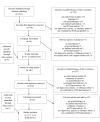Blending Face-to-Face and Internet-Based Interventions for the Treatment of Mental Disorders in Adults: Systematic Review
- PMID: 28916506
- PMCID: PMC5622288
- DOI: 10.2196/jmir.6588
Blending Face-to-Face and Internet-Based Interventions for the Treatment of Mental Disorders in Adults: Systematic Review
Abstract
Background: Many studies have provided evidence for the effectiveness of Internet-based stand-alone interventions for mental disorders. A newer form of intervention combines the strengths of face-to-face (f2f) and Internet approaches (blended interventions).
Objective: The aim of this review was to provide an overview of (1) the different formats of blended treatments for adults, (2) the stage of treatment in which these are applied, (3) their objective in combining face-to-face and Internet-based approaches, and (4) their effectiveness.
Methods: Studies on blended concepts were identified through systematic searches in the MEDLINE, PsycINFO, Cochrane, and PubMed databases. Keywords included terms indicating face-to-face interventions ("inpatient," "outpatient," "face-to-face," or "residential treatment"), which were combined with terms indicating Internet treatment ("internet," "online," or "web") and terms indicating mental disorders ("mental health," "depression," "anxiety," or "substance abuse"). We focused on three of the most common mental disorders (depression, anxiety, and substance abuse).
Results: We identified 64 publications describing 44 studies, 27 of which were randomized controlled trials (RCTs). Results suggest that, compared with stand-alone face-to-face therapy, blended therapy may save clinician time, lead to lower dropout rates and greater abstinence rates of patients with substance abuse, or help maintain initially achieved changes within psychotherapy in the long-term effects of inpatient therapy. However, there is a lack of comparative outcome studies investigating the superiority of the outcomes of blended treatments in comparison with classic face-to-face or Internet-based treatments, as well as of studies identifying the optimal ratio of face-to-face and Internet sessions.
Conclusions: Several studies have shown that, for common mental health disorders, blended interventions are feasible and can be more effective compared with no treatment controls. However, more RCTs on effectiveness and cost-effectiveness of blended treatments, especially compared with nonblended treatments are necessary.
Keywords: Internet; blended treatment; mental health; psychotherapy.
©Doris Erbe, Hans-Christoph Eichert, Heleen Riper, David Daniel Ebert. Originally published in the Journal of Medical Internet Research (http://www.jmir.org), 15.09.2017.
Conflict of interest statement
Conflicts of Interest: None declared.
Figures
Similar articles
-
Blending online therapy into regular face-to-face therapy for depression: content, ratio and preconditions according to patients and therapists using a Delphi study.BMC Psychiatry. 2014 Dec 14;14:355. doi: 10.1186/s12888-014-0355-z. BMC Psychiatry. 2014. PMID: 25496393 Free PMC article.
-
Effectiveness of blended depression treatment for adults in specialised mental healthcare: study protocol for a randomised controlled trial.BMC Psychiatry. 2016 Apr 21;16:113. doi: 10.1186/s12888-016-0818-5. BMC Psychiatry. 2016. PMID: 27102812 Free PMC article. Clinical Trial.
-
Media-delivered cognitive behavioural therapy and behavioural therapy (self-help) for anxiety disorders in adults.Cochrane Database Syst Rev. 2013 Sep 9;(9):CD005330. doi: 10.1002/14651858.CD005330.pub4. Cochrane Database Syst Rev. 2013. PMID: 24018460 Review.
-
Effectiveness of a Web-Based Guided Self-help Intervention for Outpatients With a Depressive Disorder: Short-term Results From a Randomized Controlled Trial.J Med Internet Res. 2016 Mar 31;18(3):e80. doi: 10.2196/jmir.4861. J Med Internet Res. 2016. PMID: 27032449 Free PMC article. Clinical Trial.
-
Psychological and psychosocial interventions for cannabis cessation in adults: a systematic review short report.Health Technol Assess. 2015 Jul;19(56):1-130. doi: 10.3310/hta19560. Health Technol Assess. 2015. PMID: 26202542 Free PMC article. Review.
Cited by
-
Effectiveness of Blended Internet-based Self-help and Face-to-face Intervention for Depression: A Pilot Study from India.Indian J Psychol Med. 2024 Apr 28:02537176241238289. doi: 10.1177/02537176241238289. Online ahead of print. Indian J Psychol Med. 2024. PMID: 39564242 Free PMC article.
-
Internet-based cognitive behavioural therapy for insomnia comorbid with chronic benign pain - A randomized controlled trial.Internet Interv. 2024 Oct 14;38:100781. doi: 10.1016/j.invent.2024.100781. eCollection 2024 Dec. Internet Interv. 2024. PMID: 39498476 Free PMC article.
-
Blended Psychological Therapy for the Treatment of Psychological Disorders in Adult Patients: Systematic Review and Meta-Analysis.Interact J Med Res. 2024 Oct 29;13:e49660. doi: 10.2196/49660. Interact J Med Res. 2024. PMID: 39470720 Free PMC article. Review.
-
Effectiveness of psychoeducation interventions for pregnant women with gestational diabetes mellitus: an integrative review.BMC Public Health. 2024 Oct 22;24(1):2929. doi: 10.1186/s12889-024-20428-6. BMC Public Health. 2024. PMID: 39438847 Free PMC article. Review.
-
Clinical Effects of Asynchronous Provider-Guided Practice Sessions During Blended Care Therapy for Anxiety and Depression: Pragmatic Retrospective Cohort Study.J Med Internet Res. 2024 Oct 18;26:e60502. doi: 10.2196/60502. J Med Internet Res. 2024. PMID: 39422996 Free PMC article.
References
-
- Ebert DD, Zarski AC, Christensen H, Stikkelbroek Y, Cuijpers P, Berking M, Riper H. Internet and computer-based cognitive behavioral therapy for anxiety and depression in youth: a meta-analysis of randomized controlled outcome trials. PLoS One. 2015;10(3):e0119895. doi: 10.1371/journal.pone.0119895. http://dx.plos.org/10.1371/journal.pone.0119895 - DOI - DOI - PMC - PubMed
-
- Riper H, Blankers M, Hadiwijaya H, Cunningham J, Clarke S, Wiers R, Ebert D, Cuijpers P. Effectiveness of guided and unguided low-intensity internet interventions for adult alcohol misuse: a meta-analysis. PLoS One. 2014;9(6):e99912. doi: 10.1371/journal.pone.0099912. http://dx.plos.org/10.1371/journal.pone.0099912 - DOI - DOI - PMC - PubMed
Publication types
MeSH terms
LinkOut - more resources
Full Text Sources
Other Literature Sources
Medical





